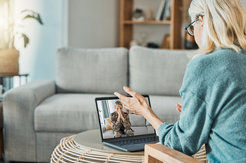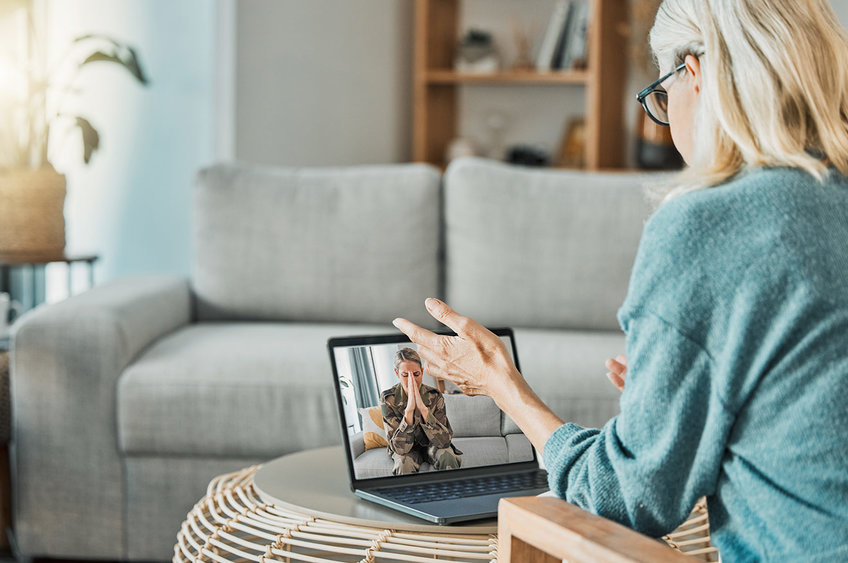Social online training helps against loneliness and depression
Online intervention helps to promote social skills and reduce mental health problems
Mental health problems, loneliness already among the youngest and polarization are rapidly increasing, especially after the Covid19 pandemic. A new large-scale research study, the CovSocial project, led by Tania Singer from the Max Planck Society, is helping people to reconnect with themselves, others and society at large. Recent findings reveal that a ten-week partner-based mental online training program was able to boost resilience, empathy, compassion and deepen social connections. At the same time, these short daily, app-based practices done with another person, so-called Dyads, decreased loneliness, depression, anxiety and a negative outlook in life. Researchers hope that this training can be scaled worldwide to overcome loneliness and social divisions.

Tania Singer, psychologist, social neuroscientist and scientific head of the Max Planck Society's Social Neuroscience Lab in Berlin, Germany, has for many years been developing mental intervention programs based on partner-based daily exercises, known as “Contemplative Dyads” as they resemble a mindfulness meditation done together with a partner in your daily life.
Unlike solitary mindfulness-based meditation practices, Dyads involve structured interactions between pairs of individuals who are taking turn in exploring loudly specific questions while the other is empathically listening without judging and interrupting in any way. The basic Affect Dyad for example consists of two questions which are aiming at both exploring and cultivating a deeper understanding and acceptance of challenging emotions as well as building resilience through the cultivation of gratitude and care.
More tolerance and less prejudice
These daily Dyads are done over ten weeks as social skill learning program and the practice is supported by teacher-lead weekly coaching sessions to help deepen the daily practice. People are randomly paired every week with a new partner to help increase tolerance, help reduce prejudice, overcome boundaries, and foster a sense of common humanity. With roots in ancient meditation traditions and recent advancements in social neuroscience, dyadic practices have emerged as a powerful tool for cultivating social skills and promoting resilience in diverse populations.
Science is now revealing the benefits of such social practices. The CovSocial Project, a large-scale mental health study spearheaded by Tania Singer at the Social Neuroscience Lab of the Max Planck Society and performed during the years of the Covid19 pandemic, revealed in its first phase, by tracking thousands of Berliners recruited from a random draw of the Berlin city register, that loneliness, stress, depression and anxiety increased with each lockdown showing severe lockdown fatigue effects. To reduce this suffering, the team therefore decided to offer in a second phase mental online training programs to those still participating in the study. The team compared the efficiency of two 10-weeks online mental training programs: a classic mindfulness-based and a partner-based socio-emotional Dyad intervention program.
Daily contemplative exercises are effective
A growing body of research is now published, giving impressive evidence that these daily social contemplative exercises done with another person are indeed effective in supporting participants mental wellbeing and health by reducing depression, anxiety and emotion regulation difficulties while at the same time increasing social skills such as empathy, self and other-related compassion. These findings give hope that such social mental practices could help overcome social divides, reducing loneliness, and improving human-to-human social connection.
A recently published paper by first author Godara showed that the ten-week online Dyad program could indeed reduce depression, anxiety and emotion-regulation difficulties while at the same time improve resilience. Interestingly, participants also showed a significant reduction in their “negative interpretation bias” - the likelihood of interpreting other people or situations in a negative way- and this decrease in negativity could actually account for the observed mental health benefits. This means that internalized knee-jerk anxieties about life or different groups or individuals can be tackled and a more positive worldview and outlook on life can be trained. Tania Singer comments on these findings: “While both interventions could decrease mental health problems, it was interesting to see that only in the dyadic social practices the reduction in negative interpreation bias was a strong candidate mechanism underlying the observed decrease in depression. We think that practicing daily gratitude during a Dyad with a partner may help boost this more positive outlook onto live and in turn strengthen one’s resilience and mental health”.
Increasing social connections
In another mental training study from the CovSocial project just published, first author Hannah Matthaeus and colleagues revealed that again only the socio-emotional Dyad practice program, but not the classic mindfulness practice program focusing on meditations done alone, could significantly reduce loneliness. Tania Singer concludes: “As in a previous large-scale mental training study, the ReSource project, we could confirm again that these daily relational practices are a powerful tool to increase social connections and facilitate people to share their difficulties and vulnerability. In the recent study, we could extend these previous findings in showing that even if practicing Dyads only online and only for ten weeks, we can find this deepening of social connections and even reduce loneliness. This offers real hope that recent alarming trends towards social isolation, loneliness and division can be reversed by scaling such inter-relational mental training programs based on Dyads”.
As the evidence for the effectiveness of this Dyad intervention builds, the study’s authors hope that they can develop ways to scale it so that these Dyad training programs can be brought to society at large and especially to domains which suffer mostly under high burn-out rates and stress such as the health-care or educational systems. Their next programs, Edu:Social School and Health will focus on exactly this: testing the effects of such Dyad programs in the context of the classroom and hospitals in the hope to increase not only the resilience of teachers and health-care providers but also boost classroom climate and team spirits and social cohesion.
The principal investigator of the CovSocial study, Tania Singer concludes: “At a time when policy-makers are grappling with a rising tide of poor public mental health and increasing loneliness and social divisions, our study shows it is possible to bring communities back together and promote positive, healthy human interactions. This is what our societies need urgently. People are crying out for a sense of belonging, community, care, and true social connections. I hope we can take the lessons of this study and begin to scale and amplify such interrelation mental training programs to benefit society. This is why we started now a follow-up study, the Edu:Social project to bring these practices into the fields of education and healthcare”.












